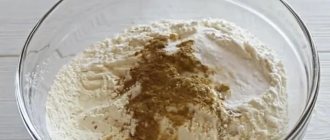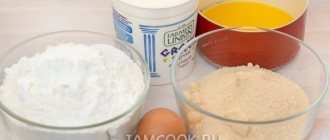One serving of this breakfast can easily feed the whole family and at the same time spend a minimum of time and effort. No less pleasant is the fact that you can use literally everything in your refrigerator to prepare a boiled omelet. But to make it tastier, it’s better to add more cheese and vegetables, and use only a couple of pieces of meat or sausage, so to speak, for flavor. We did just that and didn’t regret it for a second! According to the already established tradition, let's talk a little about the benefits of the dish and its history.
History of the omelet
In the classical sense, an omelet is a French dish made from eggs with the addition of only salt and spices. A real French omelette is fried exclusively in butter and only on one side. It is fried until almost thickened and in no case turns over, but simply curls into a tube. Another feature of the classic recipe is that it is always cooked in an open frying pan without a lid. The omelette doesn't have to be fluffy! It is this option that is used as the basis for our photo recipe for boiled omelet. The only difference is that the option we chose will be more dietary. We will find out what else its benefits are right now.
Egg omelet in a bag
Ingredients:
- 3 eggs
- 120 ml milk
- a pinch of salt
or:
- 2 eggs
- 90 ml milk
- salt
Omelette recipe in a package:
1. Beat eggs with salt and milk.
If you are cooking not at home, but on the go, break the eggs directly into the bag and shake it in it.
2. Pour into a bag.
3. Boil the eggs in a bag in low-boiling water for 15-20 minutes.
The omelette is easily removed from the bag, despite the fact that it is prepared without oil.
You can add finely chopped herbs, cheese, cauliflower, tomatoes, onions, mushrooms, defrosted shrimp, boiled finely chopped meat, berries and fruits to this omelet.
Diet omelette in a bag
Benefits of the dish
The benefit of a dish lies in the value of the products used for its preparation. In our case, these are eggs. They are a storehouse of everything useful that a healthy body may need. There are all known vitamins and microelements, as well as essential amino acids. However, we should not forget that this recipe also uses soft and hard cheese, as well as fresh vegetables. And, most importantly, this dish is prepared by boiling without the use of fat, which means it will be an excellent option for a diet in sports and health nutrition. I have no doubt that you are curious what it tastes like. It won't languish. Here is our recipe for boiled omelette in a bag step by step.
So simply and quickly we presented you with the recipe for a boiled omelette, and even step by step. Enjoy, friends. We are always happy to be useful to you and give your loved ones the joy of culinary experiments! Cook with us and you are guaranteed success in the kitchen. Your friend and assistant KhozOboz!
How to cook an omelette with cheese and bacon in a bag in a saucepan
Simple cooking method. They decided to cook it just for dinner. What is attractive about this method is the cleanliness of preparation. You do not need to wash the pan or mold afterwards if you baked it in the oven. They did it, threw the package away and that’s it.
In this version, three types of cheeses were used, Parmesan, cheddar and processed cheese. I spent about 30 minutes on all the preparation, 20 of which the omelette was boiled in water.
Calorie content per 100 grams - 191.1 kcal. Proteins - 11.9 g. Fats - 14.8 g. Carbohydrates - 2.5 g. The data is calculated automatically, so it may vary.
Ingredients
- 5 eggs
- 2 peppers
- 40 gr. Parmesan
- salt
- pepper
- parsley
- 100 gr. bacon
- 80 gr. Cheddar
- 100 gr. soft cheese
PREPARATION
Take a cooking bag and crack 5 eggs into it. Close the bag and mix the eggs thoroughly with your hands, then add the pepper.
Finely chop the parsley and grate the Parmesan cheese. Place in eggs, add salt and seasonings. We usually use "12 Vegetables and Herbs". You can use any seasonings at your discretion and taste.
We clean the peppers from seeds, cut them into small cubes, and also cut the ham. Place everything into the egg mixture.
Cut cheddar and processed cheese into small pieces. We tie the bag and beat so that all the products are well mixed. Boil water in a saucepan in advance. We put a bag of omelette in it. Cook in boiling water for about 20 minutes.
We take the bag out of the water, let it cool a little and put the omelet from the bag on a plate. Serve hot. When sliced, due to the melted cheese, the omelette turns out sticky. Original and very tasty.
These are the three recipes that we used based on Italian cuisine. If you like it, cook it, it’s not difficult and very tasty.
Author of the publication
offline 59 minutes
Similar Recipes
Cottage cheese casserole without flour and semolina
Curd cupcakes in silicone molds
Pancakes with milk and banana
Vegetable pizza
Pancakes with yogurt
Chicken breast with sauce
Eggplants in adjika
Poltava borscht
Armenian halva
Napoleon cake without eggs
Office omelette in a bag in the microwave
If you want to eat a delicious homemade omelet right in the office with a microwave, then you don’t need a pan of water.
You can safely put raw vegetables in this omelet; they won’t remain crispy in the microwave.
Ingredients:
- 2 eggs
- 1 tbsp. spoon of water
- small piece of sweet pepper
- onion quarter
- 1 fresh champignon
- slice of ham
- tablespoon grated cheese
- salt
This set of products is not available in every office, so you can adjust it to your taste and capabilities.
Cooking an omelet in a bag in the microwave:
1. Thinly slice all vegetables. The ham can be cut into cubes. Place everything in a bag.
2. Break eggs into it, add water, salt and beat well.
3. Place a securely tied bag (it’s convenient to use a ziplock bag) in the microwave and cook at maximum power for 2 minutes, then let it cool slightly.
Omelet in a bag in the microwave
And finally, a little bonus: how to cook a poached egg using a bag.
Boiled omelet in a plastic bag without milk
Usually milk or sour cream is added to the omelette, but in a bag you can make it without these ingredients. This recipe contains quite a few ingredients, but it is not necessary to use everything at once. You can put several bags with different “fillings” in a saucepan, then all family members will receive exactly the omelette that suits their taste. The amount of ingredients is calculated for one serving. Instead of tomatoes, you can add adjika to the composition. This will make the dish more piquant and unusual.
Ingredients:
- Eggs – 2 pcs.;
- Onion (green) – 1 tbsp. l.;
- Champignons – 2 pcs.;
- Ham – 2 slices;
- Hard cheese – ½ cup;
- Tomatoes – 2 tbsp. l.;
- Salt pepper.
Cooking method:
- Break the eggs and pour into a plastic bag, add a little salt and spices to taste.
- Release the air from the bag and close (tie) the bag tightly.
- Shake the bag until the egg mixture becomes homogeneous.
- Cut tomatoes, champignons, ham and onions into small cubes and add to the bag.
- Grate the cheese and mix with the rest of the ingredients.
- Release the air from the bag again and tie the bag.
- Boil water in a saucepan and place the bag in it.
- Cook the omelette for 13 minutes, then transfer it to a plate.
Interesting from the network
Recipe with vegetables
This is a healthy version of an omelet with the addition of vegetables. Calorie content – 579 kcal.
Required ingredients:
- Bulgarian pepper;
- zucchini;
- carrot;
- two broccoli florets;
- tomato;
- greenery;
- five eggs;
- stack milk.
Cooking steps:
- Cut the tomato, carrot and pepper into thin slices. Cut the zucchini into cubes.
- Chop the greens. Beat the eggs and milk. Add salt.
- Mix everything and pour into a bag.
- Place in boiling water and cook for half an hour.
Serves as an excellent dish for breakfast or afternoon snack. You can do it in different ways. Some people add tomatoes and herbs to the omelette, while others make it only from such basic ingredients as milk and eggs.
But no matter what ingredients you use, if you follow all the requirements of the recipe, you will definitely end up with a delicious and nutritious breakfast that you can easily satisfy all members of your family.
Omelet recipe in the microwave. Calorie, chemical composition and nutritional value.
Nutritional value and chemical composition of “microwave omelette”.
The table shows the nutritional content (calories, proteins, fats, carbohydrates, vitamins and minerals) per 100 grams of edible portion.
| Nutrient | Quantity | Norm** | % of the norm in 100 g | % of the norm in 100 kcal | 100% normal |
| Calorie content | 113.5 kcal | 1684 kcal | 6.7% | 5.9% | 1484 g |
| Squirrels | 10.6 g | 76 g | 13.9% | 12.2% | 717 g |
| Fats | 7.3 g | 56 g | 13% | 11.5% | 767 g |
| Carbohydrates | 1.5 g | 219 g | 0.7% | 0.6% | 14600 g |
| Water | 64.2 g | 2273 g | 2.8% | 2.5% | 3540 g |
| Ash | 1.405 g | ~ | |||
| Vitamins | |||||
| Vitamin A, RE | 107.5 mcg | 900 mcg | 11.9% | 10.5% | 837 g |
| Retinol | 0.093 mg | ~ | |||
| beta carotene | 0.022 mg | 5 mg | 0.4% | 0.4% | 22727 g |
| Vitamin B1, thiamine | 0.026 mg | 1.5 mg | 1.7% | 1.5% | 5769 g |
| Vitamin B2, riboflavin | 0.467 mg | 1.8 mg | 25.9% | 22.8% | 385 g |
| Vitamin B4, choline | 121.95 mg | 500 mg | 24.4% | 21.5% | 410 g |
| Vitamin B5, pantothenic | 0.649 mg | 5 mg | 13% | 11.5% | 770 g |
| Vitamin B6, pyridoxine | 0.063 mg | 2 mg | 3.2% | 2.8% | 3175 g |
| Vitamin B9, folates | 3.407 mcg | 400 mcg | 0.9% | 0.8% | 11741 g |
| Vitamin B12, cobalamin | 0.252 mcg | 3 mcg | 8.4% | 7.4% | 1190 g |
| Vitamin D, calciferol | 0.909 mcg | 10 mcg | 9.1% | 8% | 1100 g |
| Vitamin E, alpha tocopherol, TE | 0.248 mg | 15 mg | 1.7% | 1.5% | 6048 g |
| Vitamin H, biotin | 11.616 mcg | 50 mcg | 23.2% | 20.4% | 430 g |
| Vitamin K, phylloquinone | 0.1 mcg | 120 mcg | 0.1% | 0.1% | 120000 g |
| Vitamin RR, NE | 2.888 mg | 20 mg | 14.4% | 12.7% | 693 g |
| Niacin | 0.164 mg | ~ | |||
| Macronutrients | |||||
| Potassium, K | 128.86 mg | 2500 mg | 5.2% | 4.6% | 1940 |
| Calcium, Ca | 29.85 mg | 1000 mg | 3% | 2.6% | 3350 g |
| Magnesium, Mg | 9.31 mg | 400 mg | 2.3% | 2% | 4296 g |
| Sodium, Na | 401.65 mg | 1300 mg | 30.9% | 27.2% | 324 g |
| Sera, S | 161.21 mg | 1000 mg | 16.1% | 14.2% | 620 g |
| Phosphorus, Ph | 92.5 mg | 800 mg | 11.6% | 10.2% | 865 g |
| Chlorine, Cl | 542.68 mg | 2300 mg | 23.6% | 20.8% | 424 g |
| Microelements | |||||
| Iron, Fe | 1.123 mg | 18 mg | 6.2% | 5.5% | 1603 g |
| Yod, I | 11.53 mcg | 150 mcg | 7.7% | 6.8% | 1301 g |
| Cobalt, Co | 4.7 mcg | 10 mcg | 47% | 41.4% | 213 g |
| Manganese, Mn | 0.0169 mg | 2 mg | 0.8% | 0.7% | 11834 g |
| Copper, Cu | 60.38 mcg | 1000 mcg | 6% | 5.3% | 1656 g |
| Molybdenum, Mo | 5.08 mcg | 70 mcg | 7.3% | 6.4% | 1378 g |
| Selenium, Se | 13.103 mcg | 55 mcg | 23.8% | 21% | 420 g |
| Fluorine, F | 22.73 mcg | 4000 mcg | 0.6% | 0.5% | 17598 g |
| Chromium, Cr | 3.05 mcg | 50 mcg | 6.1% | 5.4% | 1639 g |
| Zinc, Zn | 0.5706 mg | 12 mg | 4.8% | 4.2% | 2103 g |
| Digestible carbohydrates | |||||
| Mono- and disaccharides (sugars) | 0.8 g | max 100 g | |||
| Essential amino acids | |||||
| Arginine* | 0.616 g | ~ | |||
| Valin | 0.664 g | ~ | |||
| Histidine* | 0.257 g | ~ | |||
| Isoleucine | 0.542 g | ~ | |||
| Leucine | 0.876 g | ~ | |||
| Lysine | 0.689 g | ~ | |||
| Methionine | 0.365 g | ~ | |||
| Methionine + Cysteine | 0.62 g | ~ | |||
| Threonine | 0.476 g | ~ | |||
| Tryptophan | 0.162 g | ~ | |||
| Phenylalanine | 0.581 g | ~ | |||
| Phenylalanine+Tyrosine | 0.966 g | ~ | |||
| Nonessential amino acids | |||||
| Alanin | 0.615 g | ~ | |||
| Aspartic acid | 0.98 g | ~ | |||
| Glycine | 0.356 g | ~ | |||
| Glutamic acid | 1.436 g | ~ | |||
| Proline | 0.352 g | ~ | |||
| Serin | 0.739 g | ~ | |||
| Tyrosine | 0.385 g | ~ | |||
| Cysteine | 0.251 g | ~ | |||
| Sterols (sterols) | |||||
| Cholesterol | 235.6 mg | max 300 mg | |||
| Saturated fatty acids | |||||
| Saturated fatty acids | 1.2 g | max 18.7 g | |||
| 14:0 Miristinovaya | 0.017 g | ~ | |||
| 15:0 Pentadecane | 0.004 g | ~ | |||
| 16:0 Palmitinaya | 0.847 g | ~ | |||
| 17:0 Margarine | 0.012 g | ~ | |||
| 18:0 Stearic | 0.364 g | ~ | |||
| 20:0 Arakhinovaya | 0.012 g | ~ | |||
| Monounsaturated fatty acids | 2.054 g | min 16.8 g | 12.2% | 10.7% | |
| 16:1 Palmitoleic | 0.161 g | ~ | |||
| 17:1 Heptadecene | 0.004 g | ~ | |||
| 18:1 Oleic (omega-9) | 1.691 g | ~ | |||
| 20:1 Gadoleic (omega-9) | 0.017 g | ~ | |||
| Polyunsaturated fatty acids | 0.521 g | from 11.2 to 20.6 g | 4.7% | 4.1% | |
| 18:2 Linolevaya | 0.455 g | ~ | |||
| 18:3 Linolenic | 0.025 g | ~ | |||
| 20:4 Arachidonic | 0.041 g | ~ | |||
| Omega-6 fatty acids | 0.5 g | from 4.7 to 16.8 g | 10.6% | 9.3% |
The energy value of an omelet in the microwave is 113.5 kcal.
Primary Source: Created in the application by the user. Read more.
** This table shows the average levels of vitamins and minerals for an adult. If you want to know the norms taking into account your gender, age and other factors, then use the “My Healthy Diet” application.











